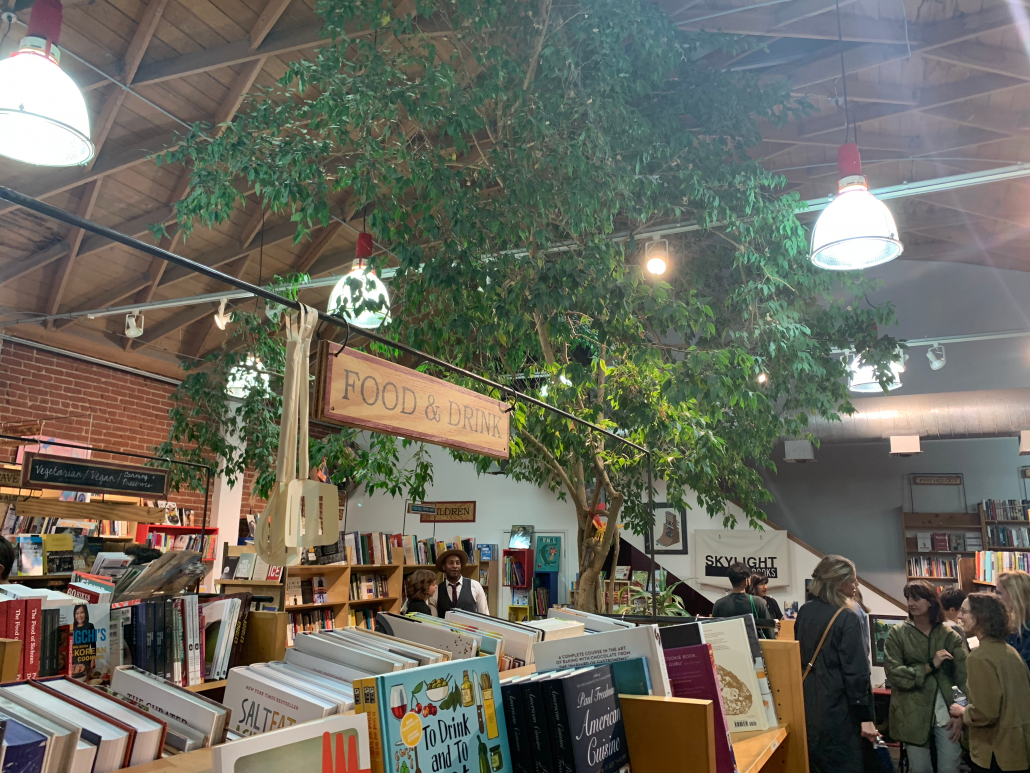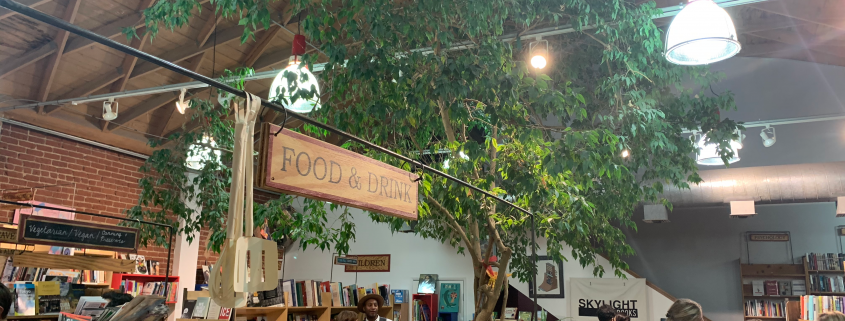Poet, USC students bring works to Skylight Books

Dozens of people gathered around a tall left-leaning tree under the domed roof of Skylight Books, a Los Feliz bookstore that often hosts various authors and artists in its intimate setting. On the evening of Feb. 29, Skylight invited three women to read their poems in front of an engaged and diverse audience just as the sun began to set. Some listeners were sitting in chairs, some were standing in groups and some lingered behind book stacks. All held their breaths in rapture as the poets poured their hearts out into their pieces.
The main visiting author, Megan Fernandes, came to read from her latest poetry book “Good Boys,” which deals with topics such as feminism, race, origin, nuclear proliferation, sexuality and “what it means to exist as a body of contractions.” She was accompanied by two other poets who read before her.
The first poet, Catherine Pond, is a Ph.D. candidate in literature and creative writing at USC whose debut collection, “Fieldglass,” won the Crab Orchard First Book Award in Poetry in 2019. Pond read three poems from her forthcoming manuscript: “Winter Sister,” “University of Iowa Museum of Natural History” and “Blue Angels Air Show.” In the poems, she addresses metaphorical figures of her friend and boyfriend over themes such as grief, depression and the passage of time.
“For me, I think my positioning in the poems is more the witness to somebody else’s grief — [when] someone that you love is suffering and not being able to do anything about it,” Pond said.
She spoke of this inability to make the ones you love happy in “Winter Sister,” a poem about a friend losing her brother.
“Somewhere what you love is still alive / turning cartwheels in a gentle snow / is the kind of lie I write years later / wishing I could make it true for you,” she read.
Pond’s voice was soothingly monotone and steady as she read, an intonation free of emphasis that deftly drove the listener to pay close attention to every word and phrase uttered.
After Pond came Callie Siskel, a doctoral fellow in creative writing and literature at USC and the author of the poetry book “Arctic Revival” released in 2015, and she read three of her pieces as well.
“I’m so happy to be at USC with [Pond], if you caught that repetition in the bios,” Siskel said proudly, adding that she wrote her third poem of the night in a workshop with Pond.
Siskel’s lilting intonation had less uniformity than Pond’s, but not to her detriment. She still spoke with flow but placed more emphasis on individual words as she read, creating almost a spoken enjambment in which the words took on their own individual meanings. Her three poems, “Messenger,” “Vanitas” and “Ab Initio,” also dealt with grief, childhood and the pasage of time, among other themes, with many of them ruminating on what it is like to lose a father.
“‘In a past life’ is not supposed to mean your life before tragedy, but an existence altogether unrecognizable, which is maybe the same thing,” Siskel proclaimed in “Ab Initio,” as she reflected on how grief shapes one’s life and identity. “No one would know me in a past life. The allure is not who we were, but who we are not.”
After ending her portion of the event on that powerful note, Fernandes finally stepped up to the microphone to read five of her “Good Boys” pieces.
Fernandes went off on passionate, crescendoing tangents only to suddenly slow down, leaving the audience reeling and hanging on to her every word. Her anger, humor, anguish and sometimes confusion clearly shone through her voice; at one point she joked about her poems, saying “they’re all bummers.” Fernandes also gave lively backstories for her poems, and many directly reference people from her life, which invited the audience further into her personal narrative.
Her first poem, “Running in the Suburbs,” offers commentary on growing up as a girl of color becoming aware of her race. “Nukemap.com” addresses the anxiety of living in New York under the threat of nuclear war, while “Conversion” paints a portrait of gay adolescence and conversion therapy.
“In my poems, I write a lot about sexuality, and struggles or thoughts I’ve had about it,” Fernandes said. “But it’s not necessarily an argument that I’m making … It’s more like this is really messy. And I’ve always felt really messy about it, and I probably will for the rest of my life.”
“Why We Drink” details Fernandes’ friendship with a man named Malik and the confusing process of aging, while her last poem, “Amsterdam,” ties together a conglomeration of issues, from the widespread voyeurism of Anne Frank’s life to her feelings of disconnect from the United States despite living there.
“I say, humiliation is like the nausea of childhood with / those delayed epiphanies. I hate the violence of insight / the lesson is always how one is ugly or dishonest, / the short-comings that could build a civilization and then did,” Fernandes read passionately in “Why We Drink,” pausing for a breath afterward to let the words sink in. Her combination of flow and pauses was reminiscent of both Pond and Siskel’s intonations.
Pond’s mother, Marjorie Pond, pointed out the interesting ways in which all three of the poets’ different voices interplayed with each other during the event.
“Each woman poet comes from her experiences of the world and feminism from a different perspective,” Marjorie Pond reflected at the end of the reading. “[Siskel’s voice] was kind of a combination of [Fernandes’] fire and [Pond’s] more soft voice. That was interesting.”
This was a welcomed blend, though, as each author complemented the other, creating a dynamic reading full of introspection, tender realizations and beautiful lyricism.

